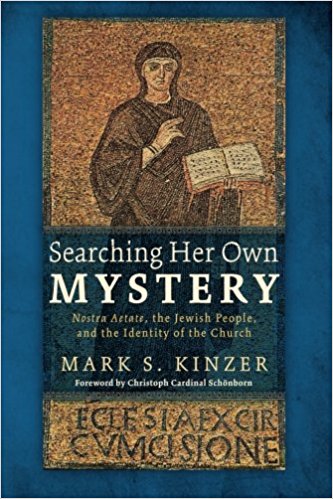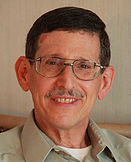Mark Kinzer: Searching Her Own Mystery
 Mark S. Kinzer, Searching Her Own Mystery: Nostra Aetate, the Jewish People, and the Identity of the Church (Eugene, OR: Cascade Books, 2015), 262 pages, ISBN 9781498203319.
Mark S. Kinzer, Searching Her Own Mystery: Nostra Aetate, the Jewish People, and the Identity of the Church (Eugene, OR: Cascade Books, 2015), 262 pages, ISBN 9781498203319.
The Messianic Jewish movement includes a broad spectrum of claims regarding authentic Jewish life and expression of faith in Jesus as Messiah. Mark Kinzer represents one band of thought within that spectrum and is recognized for his scholarly work in Jewish-Christian relations, particularly his advocacy for inclusion of the Catholic Church in Jewish-Christian dialogue. Although never officially joining Roman Catholicism, his extensive familiarity with and knowledge of Catholic tradition was gained during many years of work within a Catholic Charismatic community. Coupled with his ethnic Jewish family background, Kinzer now focuses on the 1965 Roman Catholic declaration Nostra Aetate as the backdrop for furthering his efforts to develop the identity of the Church in linkage with the Jewish people.

Messianic Jewish Theologian, Rabbi Mark S. Kinzer
Nostra Aetate (NA) promotes the reversal of centuries-long antagonism toward those of other non-Christian religions; most significantly, §4 specifically addresses the Jewish people and Judaism. Searching Her Own Mystery (SHOM) is Kinzer’s attempt to evaluate NA-4 for the contribution it may have had in overturning Christian antagonism towards the Jewish people; he also seeks to bring Jewish identity to the foreground of the Church’s purview. Ultimately, SHOM’s nine chapters and four appendices comprise Kinzer’s next step in positing the need for a Bilateral Ecclesiology (xiii). Introduced in his earlier 2005 work, Post-Missionary Messianic Judaism (PMMJ), Bilateral Ecclesiology idealizes the Church comprised of Jews and non-Jews, yet retaining ethnic distinctiveness within two parallel but separate ecclesiological communities.
Kinzer “is not motivated by a Christian missionary agenda” towards Jewish people.
Kinzer asserts that Christ is in the Church as much as He is the “inner mystery of the Jewish people.”


